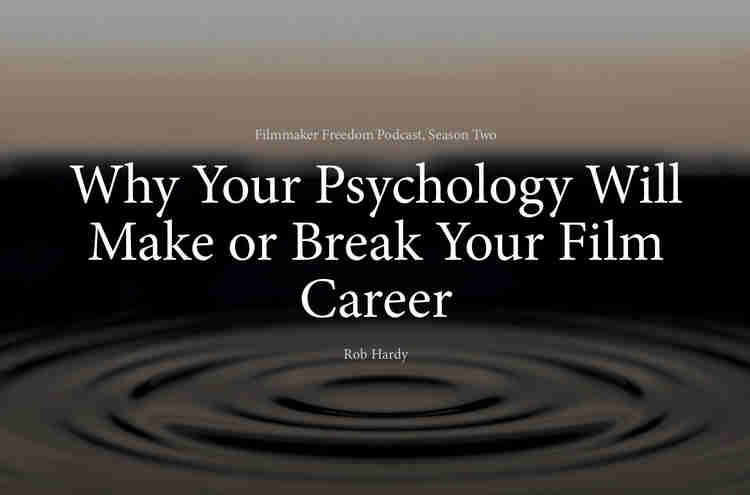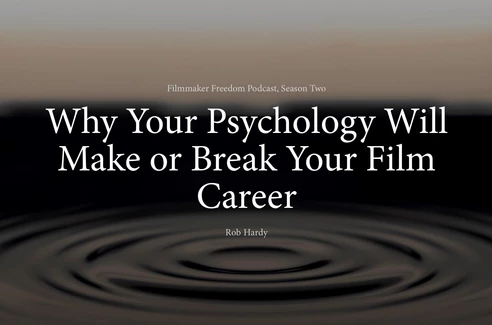Rob Hardy is the founder of Filmmaker Freedom and Ungated, where he helps creatives learn marketing, and earn a damn good living, no gatekeepers required. He lives in Tucson, AZ with his cat Swanson, and plays a ton of guitar in his spare time.

Music Partner: How Filmmaker Freedom came about?
Rob Hardy: From 2013 to 2015, I wrote for No Film School, one of the larger indie film sites around. Towards the end of my time there, I found it bit discouraging, honestly. Like most big ad-driven sites, the emphasis was on quantity, not quality, and on sensationalism, not nuance.
As someone who’s always had this itch to explore ideas deeply, I ended up starting my own site called Filmmaker’s Process. Early on, I focused a ton on the mindset, storytelling, and career side of filmmaking, instead of tech.
Then in 2018, I made a sharp turn towards marketing and entrepreneurship, and rebranded to Filmmaker Freedom. Since then, the focus on marketing has intensified.
I firmly believe that it’s possible for indie filmmakers to make a great living with work they care about. But it requires creating for niche audiences, and developing a core set of marketing skills.
Filmmaker Freedom exists to inspire and educate on those topics with a level of depth and usefulness not found anywhere else on the web.
Also, I should mention that I’ll be expanding the Filmmaker Freedom vision to all types of creators soon.
My system is applicable to musicians, authors, YouTubers, podcasters, and beyond. So I’m launching a new site called Ungated, where the aim is to help all indie creators earn their financial freedom, no gatekeepers required. The site is up now at www.ungated.media and I’ll be devoting significant time to it starting in 2021.
MP: Creating and maintaining programs, podcast, and newsletter, leaves little time for your own films. Are you still involved in artistic creations?
RH: Right now, I like to think of myself as a “filmmaker in hibernation.”
I still write and help out on local sets from time to time, but the most important thing in my life is solving the complex problem of how indie filmmakers can earn a living. Though I enjoy making films, serving my community and solving that problem provides a sense of purpose that truly drives me.
I’m sure I’ll be back making films (and music) after this season of my life. But right now, it’s all about creating a new distribution model for indie film, and teaching creators of all types how to reach audiences and market themselves effectively.
MP: Is there any of your productions available to view?
RH: Here is my cinematography reel from sometime ago.
MP: Being independent means leaning on very few support systems and doing it all. It is easy to get discourage. What are your advices to remain positive and engaged?
RH: You said the magic word with “support systems.” As filmmakers, if we try to tackle this craft and ferocious industry on our own, it’s a reliable recipe for getting burned out.
For me, the only thing that’s ever kept me positive and engaged over the long term is working on projects I find meaningful, with people I love spending time with.
With those two factors in place, the challenges of creative work are bearable, and often enjoyable. Without meaningful work and close friendships, it’s much easier to succumb to despair and lose hope.
So yeah, my best advice is to continuously work on things that matter to you. Even if they’re tiny passion projects, they’re still worth pursuing, as they keep the creative fires burning. From there, surround yourself with like-minded people you enjoy working with. With that combination, you can’t go wrong.
MP: You are not only advising on techniques, financing, or marketing, you are also talking on less tangible aspects such as attitude, mindset, why is it important?
RH: At every step of my creative and business journey, I’ve been my own worst enemy.
Whether it’s perfectionism, procrastination, imposter syndrome, or any number of psychological maladies, I am a master of getting in my own way.


And frankly, I’ve seen the exact same thing from so many other filmmakers. Everyone knows you have to be skilled and tenacious to succeed as a creative. But if you don’t win your inner battles, no amount of skill will save you.
So the second season of my podcast was dedicated entirely to this topic of mindset and psychology. It’s one of the best things I’ve ever done with Filmmaker Freedom, and I heartily recommend listening.
MP: There are tons of tips and tricks, information of all kinds relevant to independent filmmaking on your website and newsletter, how did you accumulate all this knowledge?
RH: I’ve got two answers to this question, one good and one not-so-good.
My questionable answer is that I’m a bookworm. I LOVE to read, and have for years. It’s allowed me to cram my head full of knowledge across various disciplines very, very quickly.
But there’s a sizable difference between knowledge and wisdom.
So my better answer is that most everything I share on the blog now is something I’ve lived. When I share a marketing or entrepreneurship strategy, it’s something I use in my business or with my consulting clients. And when I teach about mindset, I share what’s worked for me in conquering my own psychological demons.
It took me years to realize that real learning happens through doing the work. In retrospect, my reading habit was procrastination disguising itself in a cunning way. I felt productive, but learned very little.
MP: Technology has made filmmaking accessible to many, with or without understanding of what it takes, how do you see this evolution?
RH: Honestly, I see this as a GREAT thing. Not only is the technology to make a film accessible, but so is the technology to distribute and market it yourself with laserlike precision. That kind of power wasn’t even available to the studios 30 years ago. Now we all have it in our pockets.
In the past, the only way to reach people and make a living with creative work was through institutional gatekeepers. But now, literally anybody, in any corner of the globe can do it so long as they have an internet connection, and they do work that’s worth paying attention to.
Obviously there’s more competition than ever before, but there’s also more people online seeking media that’s relevant to their interests.
For indie creators, we can find underserved niche audiences, and be a big fish in a small pond. We can tell stories that aren’t being told in the mainstream for groups that actually care. In that way, we can sidestep the noisiness and cutthroat competition of Hollywood, and do work that matters.
Digital technology and the internet have enabled all of that to happen. And I love it.
MP: You mentioned in one of your recent newsletters, to use the downtime from the health crisis to reflect on the future. Let us be prepared and anticipate rather than react. How do you see independent filmmaking in the next 5 years?
RH: I see two stories playing out concurrently.
On the side of traditional indie filmmaking, I see the landscape getting worse. I see the competition from Hollywood and streamers becoming so brutal that even the best funded of indie projects can’t earn attention and make its money back.
On the other side, I see my crowd—the filmpreneurs. I see scrappy underdogs who say “screw the system,” make weird and niche work for discerning audiences, and who monetize directly through their fans instead of through distributors, sales agents, and platforms.
I see a world on the horizon where creatives who stick to “business as usual” will see fewer and fewer opportunities. And their entrepreneurial counterparts, the ones who innovate and break the rules, will thrive.
I’m placing my bet on the latter camp, and arming them with the tools they need to take the world by storm.
MP: You have created the community of “Freedom Fighters”. Can you describe the intention behind the initiative?
RH: There are thousands of facebook groups and forums for filmmakers out there. Most of them… kinda suck. They’re noisy, full of people spamming their work, and provide little to no value.
But at the same time, we need community. Solving a complex problem like making a living with creative work is 100x easier when we’re working together, sharing answers, and supporting one another.
The goal with Freedom Fighters was to create a real community like that, where we share a set of values and a common goal, and where we genuinely give a damn about each other's well being.
Basically, I built the community I wanted for myself, but couldn’t find anywhere else.
MP: With the development of VOD platforms, the need for new content is offering filmmakers new opportunities. With new opportunities come more intense competition to be viewed. When post-prod is wrapped-up, what should a filmmaker do to be considered by streaming platforms?
RH: This isn’t my area of expertise. But I can tell you if you wait until post-production to start looking for business options, you’ve already lost the game.
Streamers want content that pulls in new subscribers or viewers. If you can deliver that, you’re golden.
And as filmmakers, the best way for us to do that is to create projects with a hungry audience in mind, and get that audience excited about the project prior to release. In other words, show the streamers you can bring them an audience.
That creates massive leverage with distributors and streamers. It makes them want you more, and it makes you more likely to get a fair deal when so many other filmmakers get taken advantage of.
MP: Your passion is evident, you have organized your articles and programs into relevant categories. What do you enjoy the most, the craft or the business?
RH: Right now, 100% business. I love it.
But I should clarify that I'm not talking “the business” as it’s usually defined. I’m no fan of the film industry, studios, distributors, sales agents, or festivals. In fact, you won’t find many people more antagonistic towards “business as usual” than me.
My real passion is reinventing the business of film, so that it actually works for filmmakers instead of against them. It’s about creating a viable alternative to an industry that’s exploitative and predatory towards its creative talent.
Like I mentioned before, once filmmakers target niche audiences and develop their marketing skills, they gain the ability to skip the industry if they want, and go straight to their fans.


MP: You have a yearly review of music providers on your website. You acknowledge the importance of music as an enhancement to what viewers feel when watching a film, what is your process in selecting music for your projects.
RH: For filmmakers, the first line of attack should always be hiring a composer or band to create original music. That’s the gold standard, and will almost always result in the best, most original work.
However, for a lot of the people in my world who create micro budget or no budget films, that’s just not an option.
So my advice to those folks is to hit up licensing platforms. There are so many talented musicians submitting to those platforms, that you will undoubtedly find something good. You just have to be thorough and diligent in the search, because it can take awhile to find something that feels just right.
(Music Partner provides both, library of tracks to download and ready to use as well as affordable original scoring)
Music Partner: How Filmmaker Freedom came about?
Rob Hardy: From 2013 to 2015, I wrote for No Film School, one of the larger indie film sites around. Towards the end of my time there, I found it bit discouraging, honestly. Like most big ad-driven sites, the emphasis was on quantity, not quality, and on sensationalism, not nuance.
As someone who’s always had this itch to explore ideas deeply, I ended up starting my own site called Filmmaker’s Process. Early on, I focused a ton on the mindset, storytelling, and career side of filmmaking, instead of tech.
Then in 2018, I made a sharp turn towards marketing and entrepreneurship, and rebranded to Filmmaker Freedom. Since then, the focus on marketing has intensified.
I firmly believe that it’s possible for indie filmmakers to make a great living with work they care about. But it requires creating for niche audiences, and developing a core set of marketing skills.
Filmmaker Freedom exists to inspire and educate on those topics with a level of depth and usefulness not found anywhere else on the web.
Also, I should mention that I’ll be expanding the Filmmaker Freedom vision to all types of creators soon.
My system is applicable to musicians, authors, YouTubers, podcasters, and beyond. So I’m launching a new site called Ungated, where the aim is to help all indie creators earn their financial freedom, no gatekeepers required. The site is up now at www.ungated.media and I’ll be devoting significant time to it starting in 2021.
MP: Creating and maintaining programs, podcast, and newsletter, leaves little time for your own films. Are you still involved in artistic creations?
RH: Right now, I like to think of myself as a “filmmaker in hibernation.”
I still write and help out on local sets from time to time, but the most important thing in my life is solving the complex problem of how indie filmmakers can earn a living. Though I enjoy making films, serving my community and solving that problem provides a sense of purpose that truly drives me.
I’m sure I’ll be back making films (and music) after this season of my life. But right now, it’s all about creating a new distribution model for indie film, and teaching creators of all types how to reach audiences and market themselves effectively.
MP: Is there any of your productions available to view?
RH: Here is my cinematography reel from sometime ago.
MP: Being independent means leaning on very few support systems and doing it all. It is easy to get discourage. What are your advices to remain positive and engaged?
RH: You said the magic word with “support systems.” As filmmakers, if we try to tackle this craft and ferocious industry on our own, it’s a reliable recipe for getting burned out.
For me, the only thing that’s ever kept me positive and engaged over the long term is working on projects I find meaningful, with people I love spending time with.
With those two factors in place, the challenges of creative work are bearable, and often enjoyable. Without meaningful work and close friendships, it’s much easier to succumb to despair and lose hope.
So yeah, my best advice is to continuously work on things that matter to you. Even if they’re tiny passion projects, they’re still worth pursuing, as they keep the creative fires burning. From there, surround yourself with like-minded people you enjoy working with. With that combination, you can’t go wrong.
MP: You are not only advising on techniques, financing, or marketing, you are also talking on less tangible aspects such as attitude, mindset, why is it important?
RH: At every step of my creative and business journey, I’ve been my own worst enemy.
Whether it’s perfectionism, procrastination, imposter syndrome, or any number of psychological maladies, I am a master of getting in my own way.


And frankly, I’ve seen the exact same thing from so many other filmmakers. Everyone knows you have to be skilled and tenacious to succeed as a creative. But if you don’t win your inner battles, no amount of skill will save you.
So the second season of my podcast was dedicated entirely to this topic of mindset and psychology. It’s one of the best things I’ve ever done with Filmmaker Freedom, and I heartily recommend listening.
MP: There are tons of tips and tricks, information of all kinds relevant to independent filmmaking on your website and newsletter, how did you accumulate all this knowledge?
RH: I’ve got two answers to this question, one good and one not-so-good.
My questionable answer is that I’m a bookworm. I LOVE to read, and have for years. It’s allowed me to cram my head full of knowledge across various disciplines very, very quickly.
But there’s a sizable difference between knowledge and wisdom.
So my better answer is that most everything I share on the blog now is something I’ve lived. When I share a marketing or entrepreneurship strategy, it’s something I use in my business or with my consulting clients. And when I teach about mindset, I share what’s worked for me in conquering my own psychological demons.
It took me years to realize that real learning happens through doing the work. In retrospect, my reading habit was procrastination disguising itself in a cunning way. I felt productive, but learned very little.
MP: Technology has made filmmaking accessible to many, with or without understanding of what it takes, how do you see this evolution?
RH: Honestly, I see this as a GREAT thing. Not only is the technology to make a film accessible, but so is the technology to distribute and market it yourself with laserlike precision. That kind of power wasn’t even available to the studios 30 years ago. Now we all have it in our pockets.
In the past, the only way to reach people and make a living with creative work was through institutional gatekeepers. But now, literally anybody, in any corner of the globe can do it so long as they have an internet connection, and they do work that’s worth paying attention to.
Obviously there’s more competition than ever before, but there’s also more people online seeking media that’s relevant to their interests.
For indie creators, we can find underserved niche audiences, and be a big fish in a small pond. We can tell stories that aren’t being told in the mainstream for groups that actually care. In that way, we can sidestep the noisiness and cutthroat competition of Hollywood, and do work that matters.
Digital technology and the internet have enabled all of that to happen. And I love it.
MP: You mentioned in one of your recent newsletters, to use the downtime from the health crisis to reflect on the future. Let us be prepared and anticipate rather than react. How do you see independent filmmaking in the next 5 years?
RH: I see two stories playing out concurrently.
On the side of traditional indie filmmaking, I see the landscape getting worse. I see the competition from Hollywood and streamers becoming so brutal that even the best funded of indie projects can’t earn attention and make its money back.
On the other side, I see my crowd—the filmpreneurs. I see scrappy underdogs who say “screw the system,” make weird and niche work for discerning audiences, and who monetize directly through their fans instead of through distributors, sales agents, and platforms.
I see a world on the horizon where creatives who stick to “business as usual” will see fewer and fewer opportunities. And their entrepreneurial counterparts, the ones who innovate and break the rules, will thrive.
I’m placing my bet on the latter camp, and arming them with the tools they need to take the world by storm.
MP: You have created the community of “Freedom Fighters”. Can you describe the intention behind the initiative?
RH: There are thousands of facebook groups and forums for filmmakers out there. Most of them… kinda suck. They’re noisy, full of people spamming their work, and provide little to no value.
But at the same time, we need community. Solving a complex problem like making a living with creative work is 100x easier when we’re working together, sharing answers, and supporting one another.
The goal with Freedom Fighters was to create a real community like that, where we share a set of values and a common goal, and where we genuinely give a damn about each other's well being.
Basically, I built the community I wanted for myself, but couldn’t find anywhere else.
MP: With the development of VOD platforms, the need for new content is offering filmmakers new opportunities. With new opportunities come more intense competition to be viewed. When post-prod is wrapped-up, what should a filmmaker do to be considered by streaming platforms?
RH: This isn’t my area of expertise. But I can tell you if you wait until post-production to start looking for business options, you’ve already lost the game.
Streamers want content that pulls in new subscribers or viewers. If you can deliver that, you’re golden.
And as filmmakers, the best way for us to do that is to create projects with a hungry audience in mind, and get that audience excited about the project prior to release. In other words, show the streamers you can bring them an audience.
That creates massive leverage with distributors and streamers. It makes them want you more, and it makes you more likely to get a fair deal when so many other filmmakers get taken advantage of.
MP: Your passion is evident, you have organized your articles and programs into relevant categories. What do you enjoy the most, the craft or the business?
RH: Right now, 100% business. I love it.
But I should clarify that I'm not talking “the business” as it’s usually defined. I’m no fan of the film industry, studios, distributors, sales agents, or festivals. In fact, you won’t find many people more antagonistic towards “business as usual” than me.
My real passion is reinventing the business of film, so that it actually works for filmmakers instead of against them. It’s about creating a viable alternative to an industry that’s exploitative and predatory towards its creative talent.
Like I mentioned before, once filmmakers target niche audiences and develop their marketing skills, they gain the ability to skip the industry if they want, and go straight to their fans.


MP: You have a yearly review of music providers on your website. You acknowledge the importance of music as an enhancement to what viewers feel when watching a film, what is your process in selecting music for your projects.
RH: For filmmakers, the first line of attack should always be hiring a composer or band to create original music. That’s the gold standard, and will almost always result in the best, most original work.
However, for a lot of the people in my world who create micro budget or no budget films, that’s just not an option.
So my advice to those folks is to hit up licensing platforms. There are so many talented musicians submitting to those platforms, that you will undoubtedly find something good. You just have to be thorough and diligent in the search, because it can take awhile to find something that feels just right.
(Music Partner provides both, library of tracks to download and ready to use as well as affordable original scoring)


